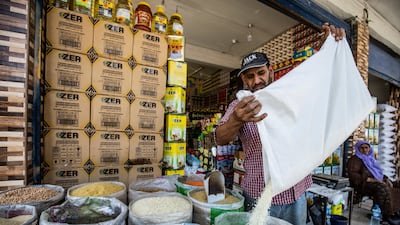Rakan Al Ahmadi is a construction worker living in north-east Syria. He cannot afford to fast this Ramadan, he says.
Mr Al Ahmadi, 47, who was displaced from Deir Ezzor in eastern Syria to Qamishli in 2012 amid the country's civil war, makes $7 a day. He says the money is barely enough to put food on the table for his family of five.
“How can I fast this year when living expenses now far exceed my income? Rent is $40 a month. As a manual worker, I need physical strength, which is impacted by fasting," Mr Al Ahmadi told The National.
Shirzad Al Kurdi, 49, faces similar challenges. He works more than 10 hours a day selling women’s clothing at a street stall in Qamishli’s central market.
“I make $10 to $15 a day but I also support my mother, who suffers from chronic diabetes and hypertension,” he told The National. “My daughter attends university and my two sons are in school. How can I afford the high prices of Ramadan?”
The family survives on some vegetables, water and tea, Mr Al Kurdi says. It costs him $6 a day. The rest of his earnings are spent on rent and his children's education.
In Qamishli, in north-east Syria, families say they are already too hungry to fast during Ramadan.
Surging poverty
During the holy month, which started on Monday, Muslims abstain from food and drink from dawn until sunset every day. It is a time of worship and celebration during which families gather for iftar in the evening, a meal traditionally replete with special dishes, desserts and drinks.
This is not the case in parts of Syria this year. Poverty has surged and soaring inflation has forced people to survive on the bare minimum.

About 12.9 million Syrians are food insecure and 2.6 million are at risk of hunger, the World Food Programme warned. In January, the WFP was forced to end the general food assistance programme in Syria because of funding shortages, directly affecting 3.2 million people.
After 12 years of conflict and economic crisis, the situation worsened, according to the UN. The earthquake that struck northern Syria and Turkey in February last year further exacerbated the crisis.
Economists say living conditions in Syria are at their worst since the beginning of the 20th century. The local currency has lost more than 99 per cent of its value since 2011 and notes are worth less than the cost of printing them.
The country's infrastructure, already weakened by the civil war, has been further compromised by years of US-imposed economic sanctions and government policies that drove up the cost of basic goods and services.

Many Syrians can no longer afford the food required to compensate for the long hours of fasting – food price inflation has increased by up to 40 per cent in the past year, Syrian Centre for Policy Research in Damascus said.
Shaam Network, an official Syrian government website, reported the cost of an iftar meal for a family of five was at least 300,000 Syrian pounds ($20), which is far too expensive for day labourers whose daily income does not exceed $10.
Zakat is the solution
An imam in Qamishli said there was no provision for manual workers to break their fast during Ramadan.
“There is no precedent for this in Islamic jurisprudence, such as the permission granted to pregnant women, or the sick," he said.
If workers became too unwell to fast, they should not eat or drink in public and must have the intention to make up for these days when their circumstances improve, he said.
Kurdish activist
But Akko, a Kurdish activist in Qamishli, said the issue was broader. “The problem is that people are now posting pictures of expensive dishes on social media, not worshipping God,” Akko told The National.
“Instead, they must distribute food and give alms and zakat to help the poor in their communities all year round."
This article is produced in collaboration with Egab.

